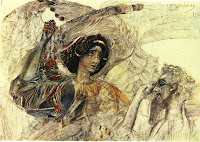On Becoming a Seraph
By Jake Wilson
February 2, 2010
The sixth chapter of Isaiah concludes the opening section of the book with a vision of God and the calling of a prophet. In the year that King Uzziah died Isaiah is gifted with a vision of God in the Temple. The vision offers relatively few details of God’s appearance. All we are told is that the Lord was sitting on a throne, high and lofty and that the hem of his robe filed the Temple. The understated nature of this vision of God (compared to Revelation 1:12-16 for example), displays the challenge of describing God’s ineffable majesty.
Where Isaiah fails (rightly) to describe God, the text devotes more than three times as much space to God’s attendants, the Seraphs. The Seraphs are six winged angelic beings, likely serpentine in form, who eternally proclaim God’s holiness. Their only appearance in the Bible is here in Isaiah chapter six (although similar angelic attendants appear in Revelation 4:8). As servants of the holy God their other worldly appearance proclaims bodily what they also proclaim with their song; all who follow the triune God are called be holy as he is holy. The amount of space given to the description of the Seraphs should alert us to their importance for the preaching of this text.
Although we are told this text narrates the event of a vision we could just as appropriately name the event a performance as it is the song of the Seraphs which gives meaning and direction to the theophony. As the Seraphs attend the triune God, they call to one another singing:
Holy, holy, holy is the Lord of hosts;
The whole earth is full of his glory.
Their song proclaims the holiness of the triune God with such power that the foundations of the Temple are shaken. The force of their proclamation, coupled with God’s presence, calls forth an immediate response of fear and trembling from Isaiah.
This text is instructive for the Church in that the people of God are called to become like Seraphs. It is the task of the Church to proclaim God’s holiness with such power and beauty that world is shaken to its foundation. This proclamation is accomplished through our embodiment of an other-worldly form of life that includes our appearance and our speech. The Seraphs not only proclaim God’s holiness, as six winged snakes of fire, they are holy. So must the Church live out the holiness it proclaims.
The witness that the Church’s life provides is meant to call forth a response akin to Isaiah’s in two ways. The holiness of God’s people helps to convict the world of its true identity. In revealing himself through the Church, the holy God confronts the surrounding world with its own brokenness. Conversely, just as the song of the Seraphs helped move Isaiah to a place of joining in the work of proclamation (“Here I am, send me…”) so the proclamation of God’s holiness through the life of the Church calls others to join in.
In the Communion liturgy of The United Methodist Church, after a litany of the mighty works of God in creating the heavens and the earth, in calling a chosen people and sending them the prophets, the celebrant calls upon the congregation to join in the celebration with these words:
And so, with your people on earth, and all the company of heaven, we praise your name and join their unending hymn:
Holy, holy, holy Lord, God of power and might,
Heaven and earth are full of your glory.
This is not an isolated moment within the celebration of the Eucharist but rather a summation of the task of the Church in all times and all places. We are called to join the company of heaven in praise and proclamation. This week, the preacher will call the congregation to become Seraphs.
